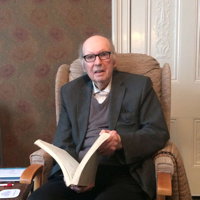 CENTRAL ENGLAND: Mike Wheeler's concert reviews from Nottingham and Derbyshire feature high profile artists on the UK circuit - often quite early on their tours.
CENTRAL ENGLAND: Mike Wheeler's concert reviews from Nottingham and Derbyshire feature high profile artists on the UK circuit - often quite early on their tours.
PROVOCATIVE THOUGHTS: 
The late Patric Standford may have written these short pieces deliberately to provoke our feedback. If so, his success is reflected in the rich range of readers' comments appearing at the foot of most of the pages.
 SPONSORED: Profile. A Gold Mine - Roderic Dunnett visits Birmingham to talk to John Joubert.
SPONSORED: Profile. A Gold Mine - Roderic Dunnett visits Birmingham to talk to John Joubert.
All sponsored features >>
Michio Mamiya
Japanese composer, writer and translator Michio Mamiya was born in Asahikawa, Hokkaido on 29 June 1929. After teaching himself composition and piano, he studied with Tomojiro Ikeuchi in the composition department at Tokyo Music School (now Tokyo University of the Arts).
Several of his many choral works incorporate elements of traditional Japanese folk music.
His four operas include Narukami (1974), based on a kabuki play with the same name, and the first production at the Salzburg Opera Festival used puppets instead of actors, but it has also been performed more recently with a human cast.
He also wrote a symphony and other orchestral music, concertos, music for brass band and vocal, chamber and instrumental music.
His film scores include Grave of the Fireflies (1988). He also wrote music for TV programmes, was author/co-author of several books and translated Bartók's Hungarian Folk Songs into Japanese.
Michio Mamiya died in Tokyo from pneumonia on 11 December 2024, aged ninety-five.

